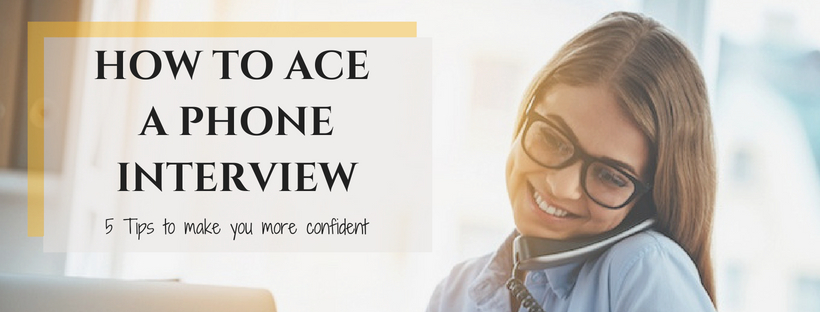How to Ace a Phone Interview

By Shannon Looney, June 21 2018
*
A phone interview is like an open book exam. You’ll want to prepare for it thoroughly, but you also have the help of a “cheat sheet” to bolster your confidence. In any interview it is important to prepare yourself, whether that is brushing up on the history of the company, the background of your interviewer, or reading up on the company culture. A phone interview is a different ballgame to a traditional face-to-face interview, and because of that I have compiled five important points to help ensure you ace your next one!
1. Set the Stage
One positive when it comes to being asked to interview by phone is your ability to control the environment in which the conversation takes place. Because of this, you have a responsibility to yourself to be in a space where you can perform at your very best. From my experience it is best to be in a reserved room, with limited noise and distractions. If you’re on your college campus there are often rooms that you can book specifically for phone interviews. Check with your career or professional service offices for more information, and be sure to reserve in advance!
Although reserved rooms are preferable, a quiet space in your home works as well. If staying at home is your only option, be sure to prepare your space for the least amount of disturbances so that you can stay focused and in a professional state of mind. Make sure that your family or friends know you are on an important call so that they don’t interrupt.
When you are comfortable, you are more confident, and that can be sensed over the phone. Whatever you feel is going to set you up for a successful phone interview will be your best option!
2. Dress the Part
Another way for you to put yourself in the mindset of an interviewee is by dressing the part. Most companies would prefer to talk to you in person, so phone interviews are for initial stages and usually more convenient for both parties. However, just because you can’t see your interviewer, doesn’t mean that you shouldn’t dress appropriately.
I find that when I have dressed professionally for a phone interview it has influenced my performance for the better. Wearing pajamas can subconsciously influence a person to become more relaxed and sleepy, rather than encouraging an invigorating, and confident conversation. The old adage of dressing for the job you want still applies when it comes to phone interviews!
3. Do Your Homework
When an interviewee knows the history of a firm or the standards that they work to, it gives them an edge, and most often results in a positive impression. As with all interviews it is important to do your homework. Preparing your own questions in advance and comments on interesting aspects you have found through your research will boost your confidence, which can still be detected, even over the phone!
Another important reason for you to do some research on the company or on the interviewer is because you are not going to have the ability to impress them with nonverbal body language, thus it is imperative to dazzle them with your wisdom.
4. Listen then Speak
It is important to be alert during a phone interview. Be certain to listen to the full question before answering. There could be technical difficulties, or a pause in the conversation. Thus, it’s important to listen, then speak. Be patient, phone interviews will flow differently to the way a traditional in-person interview would. When it is time for you to speak, that is when you can take the stage and verbally illustrate to the interviewer why you are best fit for the job. Being upbeat and energetic is vital to a phone interview because you only have your voice to fully express your interest in the position.
Another important tip is to use a pen rather than a computer when taking down notes during the interview. Eliminating the sound of typing keys gives you a better opportunity for understanding the questions that come your way, as well as the tone of the interviewer.
5. Ending the Call and Following Up
Sometimes it’s hard to determine when to end a phone interview. My best advice is to do so when all your questions are answered and what feels like a natural stopping point. With all types of communication we as social beings can sense when a conversation has completed its course. Ending on a positive note is also very important. Something as simple as, “its been a pleasure speaking with you, if you happen to have any questions regarding my qualifications please email or call me,” will have you leaving the interview on a high.
Once you’ve said your parting words and you click the end call button, your chance to impress the company is not over. There is still a window of opportunity for leaving an impact that will not be forgotten, and that includes following up with the interviewer. This can be done via an email or even a thank you note. These days, emails are a more common way of following up with any professional interaction, but the art of handwritten notes will always remain the most classic. Either way, both are valuable to putting the final touches to any good interview.
The tips listed above can equip you for any kind of interview. But there is a unique comfort in the control you have over certain variables when it comes to a phone interview. From my experience, I highly advocate treating it as if you were going to the offices of the company because it truly will prepare you mentally for the call. With most things in life, preparation and practice are key ingredients, and that goes for phone interviews as well. Good luck and start prepping!
